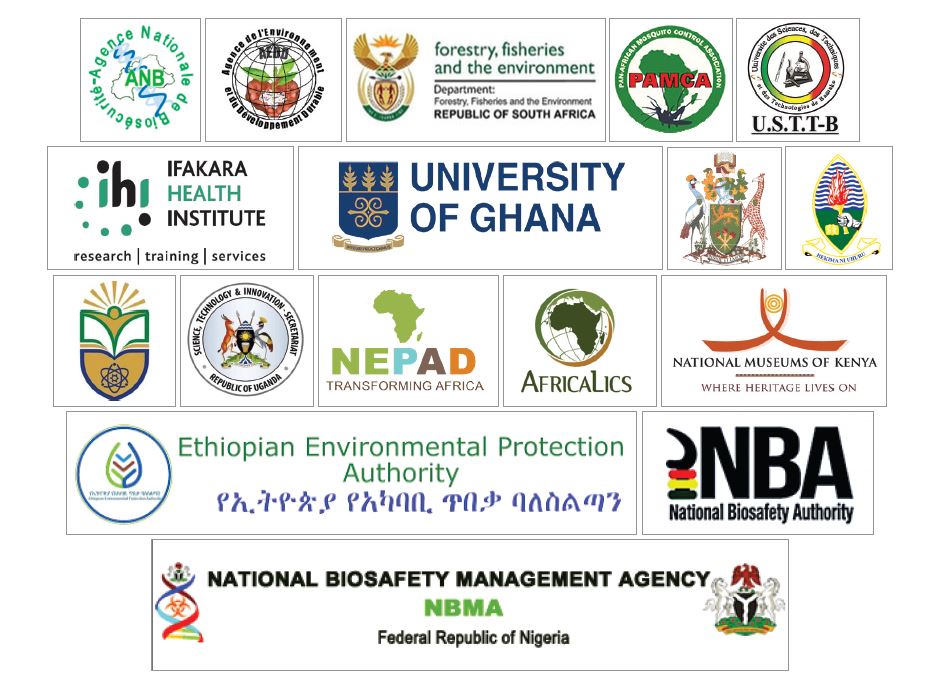Consultative Workshop on Anticipated Decision-Making Process for Field Trials and Post-Release Monitoring of Genetic Biocontrol Agents and their Derived-Products
On May 16-19, 2023, the African Genetic Biocontrol Consortium, the GeneConvene Global Collaborative at the Foundation for the National Institutes of Health (FNIH) USA in partnership with the National Biosafety Authority in Kenya will host a 4-day consultative workshop on Anticipated Decision-Making Process for Field Trials and Post-Release Monitoring of Genetic Biocontrol Agents and their Derived-Products in Nairobi, Kenya.

The workshop will target professionals from African countries who are environmental experts and practitioners to discuss the status of implementation of environmental principles in decision-making processes during research, field trials and deployment of genetic biocontrol technologies (which include gene drive/editing or synthetic biology). During the workshop, a report on the recent survey to identify concerns that may arise during the post release monitoring of gene-drive containing mosquitoes for malaria control will be presented. Participants will have an opportunity to provide further insights on the concerns raised. The post release monitoring study is one of the initiatives to understand the potential pathway for use of gene drive-containing mosquitoes to prevent the transmission of malaria. Participants will include researchers, environmental experts, policy makers and regulators from industry, government, academia, and the private sector in Africa.
The main objective of this Workshop is to provide a venue for informational opportunities and in-depth discussion and debate on the needs and requirements for testing of genetic biocontrol technologies by experts from countries most likely to experience both the risks and the benefits of these new technologies. The Workshop will provide an opportunity for participants to be sensitized on the technical and regulatory requirements for testing and decision-making of emerging biotechnologies which include gene drives/editing and synthetic biology from an African context. Stakeholder participation and engagement during research and field trials/release of modern biotechniques at the national, regional, and continental levels will also be shared. To boost their oversight skills, the participants will undergo practical hands-on training on how to review an application dossier and to develop decision-making reports and communication for environmental release of a genetic biocontrol product.
For sustainability, the participants will use the workshop to develop/review their unique national guidelines, environment risk assessment and other applicable tools, Application Forms, and Standard Operating Procedures (SOPs), that support national oversight on environmental release and commercialization of a genetic biocontrol technologies in their countries. Survey report on post release monitoring concerns on Gene Drive containing mosquitoes for malaria control will also be presented and participants provided with opportunity to provide further insights.
Expected Outcomes
The Workshop will provide an opportunity for participants to learn:
- The technical and regulatory requirements for testing and decision-making of emerging biotechnologies which include gene drives/editing and synthetic biology from an African context.
- The requirements for stakeholder participation and engagement during research and field trials/release of modern biotechniques at the national, regional, and continental levels.
- How to review an application dossier and to develop decision-making reports and communication for environmental release of a genetic biocontrol product.
- How to develop/review their unique national and institutional guidelines, environment risk assessment and other applicable tools, Application Forms, and Standard Operating Procedures (SOPs), that support national oversight on environmental release and commercialization of a genetic biocontrol technologies in African countries.
- About the post release monitoring concerns, initiative and the potential pathway for use of gene drive-containing mosquitoes to prevent the transmission of malaria in Africa.
The African Genetic Biocontrol Consortium is an agreement established by not-for-profit member organizations based in Africa with a vision to build an informed local leadership to support the requirements for development, decision-making and on the utility of genetic biocontrol technologies for animal, public health, and conservation in Africa. To fulfil this vision the Consortium has established a Forum for Environmental Practitioners in Africa (FEPA) with an objective to provide a platform for enhancing interaction, technical capacity towards meeting global and national requirements and best practices on genetic biocontrol technologies among environmental practitioners. Through the Forum the participants will be expected to support the Consortium to:
- Establish a Steering Committee to steer FEPA.
- Identify experts already working in Ministries of Environment and agencies (e.g. NEMA) or industry in Africa to join FEPA.
- Disseminate knowledge and training on genetic biocontrol technologies.
- Develop a roster of experts that support Environmental Assessments (SEA, EIA, ERA) and decision-making processes for genetic biocontrol technologies.
- Further support development of post-release monitoring guidelines for gene drive-containing mosquitoes for malaria control in Africa.
Acknowledgements

